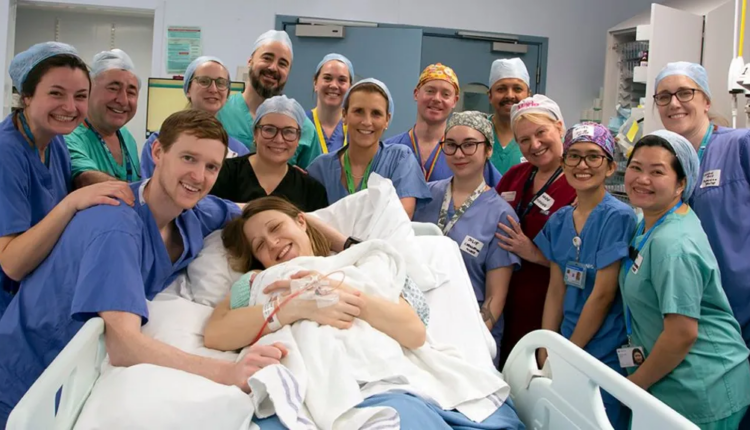A “miracle” baby girl has become the first child in the UK to be born to a mother who received a donated womb.
Grace Davidson, 36, was born without a functioning uterus, but in 2023, she received a successful womb transplant from her sister, Amy Purdie. The operation marked a major milestone as it was the first successful womb transplant in the UK.
Grace and her husband, Angus, 37, named their daughter Amy after Grace’s sister, who made this incredible gift. Grace says holding baby Amy, who weighed just over four and a half pounds, for the first time was “incredible” and “surreal.” She describes it as overwhelming because they had never imagined what it would be like to finally have their own child.
Grace and Angus, originally from Scotland but now living in north London, plan to have a second child using the transplanted womb. While they had initially wished to stay anonymous, they now feel ready to share their “little miracle” with the world.
The surgical team that performed the womb transplant has since completed three more transplants using deceased donors, as part of a clinical trial aimed at performing 15 successful transplants.
Grace was born with a rare condition called Mayer-Rokitansky-Küster-Hauser (MRKH) syndrome, where a woman is born without a uterus but still has functioning ovaries. In 2018, Grace hoped that her mother could donate her womb, but it was not suitable. In 2019, her sister, Amy, stepped forward to donate hers. Amy already had two children and did not wish to have any more, so she and Grace underwent counselling, and the decision to proceed was made.
Before the surgery, Grace and Angus also underwent fertility treatment and now have several embryos in storage. Grace had been given the option of surrogacy or adoption, but she felt strongly about carrying her own baby. “I’ve always had a mothering instinct,” she says, “but for years I had been suppressing it because it was too painful to think about.”
Womb transplants have been performed successfully in other countries, with the first being carried out in Sweden in 2014. Since then, over 135 womb transplants have been performed worldwide, leading to the birth of about 65 babies. Grace’s transplant was initially scheduled for 2019, but it was delayed due to the Covid-19 pandemic.
When it finally took place in February 2023, the surgery took 17 hours, with over 30 medical professionals involved.
Isabel Quiroga, the surgeon who led the transplant team at Churchill Hospital in Oxford, says that despite the risks involved, the procedure was “life-enhancing and life-creating.” Amy, the donor, says she did not experience the loss that some women feel after a hysterectomy because the immediate and life-changing benefits for her sister were so clear. Grace had her first period within two weeks of the transplant and became pregnant on her first attempt with IVF.
Baby Amy was born on February 27, 2024, via Caesarean section at Queen Charlotte’s hospital in London. “It was an incredible moment, full of joy,” says surgeon Quiroga.
The couple hopes to have a second child once their medical team gives the go-ahead. After the birth of a second child, Grace’s donated womb will be removed. This will allow Grace to stop taking immunosuppressant medication, which she currently needs to prevent her body from rejecting the transplant.
The medication carries some long-term risks, but these are expected to subside once the womb is removed.
Prof. Richard Smith, a gynaecological surgeon who led the organ retrieval team, has been researching womb transplants for over 20 years. He says the birth of Amy has brought hope to many women in the UK who were born without a uterus. There are approximately 15,000 women of childbearing age in the UK without a functioning womb, and around 5,000 of them were born without one.
Prof. Smith also runs Womb Transplant UK, a charity that helped cover the NHS costs for Grace’s transplant. The charity has funded other transplants, with many women now undergoing fertility treatment or having embryos stored in preparation for a womb transplant. Each transplant costs around £30,000, and the charity has funds for at least two more operations.
Grace and Angus will never be able to thank Amy enough for her selfless gift. “It was an absolute no brainer” to name their daughter after Amy, says Angus.
The baby’s middle name is Isabel, after the surgeon who led the transplant team. For Grace, having Amy has strengthened the bond between her and her sister. “It was incredibly difficult to let her do that for me,” Grace says, “but it’s the most amazing act of sisterly love.”
Source: BBC


Comments are closed.